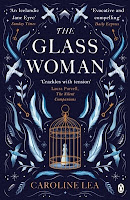 |
| (Amazon UK link) |
The prologue is rather chilling - it features a dead body coming to the surface of a sea, so cold that it’s covered in ice. It’s quickly clear that the whole story is set in Iceland, but we don’t learn the circumstances leading up to the prologue until fairly late in the book. However the scene stayed in my mind throughout.
The main part of the story then begins in August 1686. Rósa, a young woman in her twenties, is sitting in her chilly croft with her mother. Her beloved father died before the story started, and since he’s gone they have struggled to survive. Now Rósa’s mother has a bad cough, and Rósa is worried that it’s going to get worse, possibly proving fatal. And she has to make a very difficult decision.
The narration is cleverly done, moving forwards and backwards in time as we gradually learn the circumstances of Rósa’s life. She has a childhood friend, Páll, whom she had hoped to marry, but their families don’t take this seriously. So when a wealthy stranger from another part of Iceland offers to marry her - and to provide food and fuel for her mother and their neighbours - she feels that she has no choice but to accept. And now she has to travel for several days on horseback, accompanied by her new husband’s apprentice Pétur. She has little idea what to expect, and it’s likely that she won’t see her mother (or Páll) again.
Rósa is a strong-minded person but her culture and upbringing have taught her to be submissive. She knows that, as a wife, she will have to work hard and obey whatever her husband asks her to do. And she’s willing to do that, for the sake of her mother. But some of her husband’s orders seem unreasonable: there’s a locked loft at the top of their croft, for instance, which she must never try to enter. And she’s not allowed to invite any of the people from the village into their home, nor is she to socialise with anyone.
This isn’t the kind of environment or period of history that would normally interest me, but the writing is so good that I found it quite compulsive. I set myself to reading 100 pages per day, as it’s a 400-page book and I wanted to finish it on Sunday. Instead, I read over half of the book yesterday, and finished it this morning.
I still don’t know entirely what drew me in, as I didn’t really engage with any of the characters. Nor was the story a pleasant one: the society was quite primitive in many ways, with harsh punishments for anything hinting of witchcraft. Rósa could be beaten if she disobeys anything that her husband Jón asks. Killing of animals and birds is a natural part of society, and when Rósa attempts some empathy, it’s pushed down.
She manages to befriend one or two of the local women but the more she does that, the more she realises they’re keeping secrets - and nobody will tell her anything about Jón’s first wife, Anna, other than that she died. Apparently this was from a sickness, but local folk are suspicious.
The marriage is a strange one in other ways. Jón rarely approaches Rósa at night, even though she expects him to do so. He works hard, and does show occasional affection, but she’s treated more as a housekeeper than a wife.
I found the book a little slow at first, but after the first 100 pages it was difficult to put down, so I ended up reading it any time I had a few minutes to sit down. The story is extremely well written, and my mind was full of questions - what are the noises Rósa hears at night? Or does she imagine it? Who exactly is Pétur? What happened to Anna? What secrets is Jón keeping…?
In the latter half of the book there’s an extra element introduced, in the first person, with Jón as the narrator. This jarred a little at first, but I quickly realised that it was a clever device, to increase the suspense.
I wouldn't say I enjoyed the book, exactly, but I’m glad I read it. I’ve learned a lot about historic Icelandic culture, and I’m sure that some of the story will stay with me for a while. I doubt if I’ll read the book again, but I would recommend it to anyone who likes mildly suspenseful stories and who is looking for something a bit different.
Review copyright 2024 Sue's Book Reviews
No comments:
Post a Comment